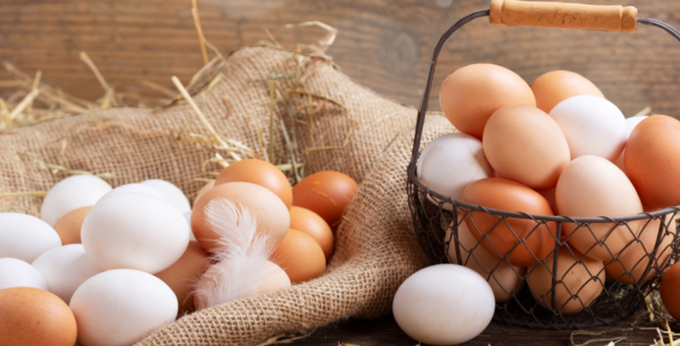June 21, 2025 | 01:02 GMT +7
June 21, 2025 | 01:02 GMT +7
Hotline: 0913.378.918
June 21, 2025 | 01:02 GMT +7
Hotline: 0913.378.918

Soaring US egg prices put pressure on consumers, businesses
Americans in recent years have increased the number of eggs they consume while reducing their intake of beef and venison, according to data from the U.S. Department of Agriculture.
Egg consumption has grown in part because more families are eating them as their main protein substitute, Los Angeles Times reporter Sonja Sharp told CBS News. "Each of us eats about as many eggs as one hen can lay a year," she said.
As demand for eggs has risen, production in the U.S. has slumped because of the ongoing bird, or "avian," flu epidemic. Nearly 58 million birds have been infected with avian flu as of January 6, the USDA said, making it the deadliest outbreak in U.S. history. Infected birds must be slaughtered, causing egg supplies to fall and prices to surge.
Families and restaurants alike are now paying elevated prices for eggs as the outbreak impacts 47 states.
In California, for example, data shows the average price for a dozen eggs reached $7.37 last week, compared with $2.35 a year ago. The national average egg price per dozen wholesale is now $3.30, the USDA said last week. The average price for a dozen eggs by U.S. city grew to a record $3.58 in November, according to the most recent data available from the Federal Reserve Bank of St. Louis.
In some places, it can even be hard to find eggs on the shelves. But egg supplies overall are holding up because the total flock of egg-laying hens is only down about 5% from from its normal size of around 320 million hens. Farmers have been working to replace their flocks as soon as they can after an outbreak.
Sharp said prices will likely not fall again until after new chickens are born without the infection and grow to egg-laying age. More than 300 flocks of farm-raised poultry have been hit by the outbreak as of last Friday, according to USDA data.
In New York, grocery store owner Jose Filipe said that soaring egg costs have caused many customers to change their spending habits.
"I've seen customers gravitate from buying organic eggs now to more conventional eggs, and specifically now, the half dozen. Prices have quadrupled in about six or seven months," he recently told CBS New York's Jenna DeAngelis.
What is avian flu?
Bird flu is carried by free-flying waterfowl, such as ducks, geese and shorebirds, and infects chickens, turkeys, pheasants, quail, domestic ducks, geese and guinea fowl. In another major recent epidemic of the disease, it killed more than 50 million chickens and turkeys in 2014 and 2015, while causing economic losses of $3.3 billion, the USDA estimates. The agency is now researching a potential vaccine against the bird flu.
Fortunately, the public health risk related to bird flu remains low, according to the U.S. Centers for Disease Control and Prevention. Still, cooking all poultry and eggs to an internal temperature of 165 ˚F is advised as a general food safety rule.
The cost of processed eggs — used in liquid or powdered form in manufactured products including salad dressing, cake mix and chips — has also surged, adding to inflationary pressures.
The Consumer Price Index — a closely watched inflation gauge — rose 7.1% in December from the previous year. Falling prices for energy, commodities and used cars offset increases in food and shelter.
Even with the cost increases, however, eggs remain relatively cheap compared to the price of other proteins like chicken or beef, with a pound of chicken breasts going for $4.42 on average in November and a pound of ground beef selling for $4.85, according to government data.
But if egg prices remain elevated, Chicago resident Kelly Fischer said she will start thinking more seriously about building a backyard chicken coop because everyone in her family eats eggs.
"We (with neighbors) are contemplating building a chicken coop behind our houses, so eventually I hope not to buy them and have my own eggs and I think the cost comes into that somewhat," the 46-year-old public school teacher said while shopping at HarvesTime Foods on the city's North Side. "For me, it's more of the environmental impact and trying to purchase locally."
Eggs are just one of a tiny list of food staples that skyrocketed in prices in 2022. Margarine prices grew 47% between November 2021 and November 2022, according to the most recent Consumer Price Index data available. Butter prices rose as well, from $3.47 a pound in November 2021 to $4.63 per pound in November 2022, according to the Federal Reserve Bank of St. Louis.
(AP)

(VAN) Poultry production in Poland, which has only started recovering from devastating bird flu outbreaks earlier this year, has been hit by a series of outbreaks of Newcastle disease, with the veterinary situation deteriorating rapidly.

(VAN) Extensive licensing requirements raise concerns about intellectual property theft.

(VAN) As of Friday, a salmonella outbreak linked to a California egg producer had sickened at least 79 people. Of the infected people, 21 hospitalizations were reported, U.S. health officials said.

(VAN) With the war ongoing, many Ukrainian farmers and rural farming families face limited access to their land due to mines and lack the financial resources to purchase needed agricultural inputs.

(VAN) Vikas Rambal has quietly built a $5 billion business empire in manufacturing, property and solar, and catapulted onto the Rich List.

(VAN) Available cropland now at less than five percent, according to latest geospatial assessment from FAO and UNOSAT.

(VAN) Alt Carbon has raised $12 million in a seed round as it plans to scale its carbon dioxide removal work in the South Asian nation.